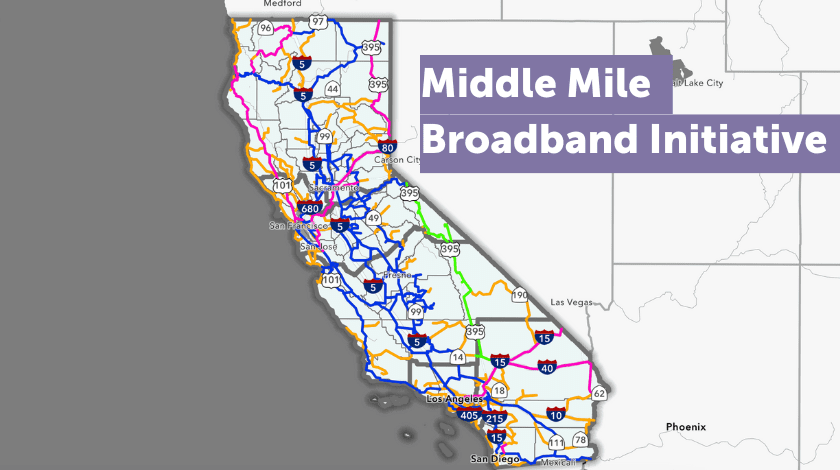By Cristal Mojica
When the August and September rounds of broadband infrastructure maps and routes were released by the California Public Utilities Commission and California Department of Technology, delineating which communities would fall under a Phase 1 and Phase 2 Middle Mile Broadband Initiative build-out plan, it was revealed that California’s State agencies—entrusted with the equitable allocation of $3.25B in Middle Mile funding—are not just relying on bad maps, but demonstrably discriminatory ones.
In some cases, not only were more than 60% of the originally proposed Middle Mile infrastructure miles removed—or “optimized”—from high-need, underinvested communities, such as South East Los Angeles, but also those same communities were then dealt a second blow by being deprioritized and relegated to Phase 2 of the build out. Particularly shocking was the fact that some of these community projects were cited as examples of areas that would benefit from this investment in the Governor’s original press release announcing the Initiative.
The state cited high cost and insufficient funding to cover the originally planned 10,000 miles of Middle Mile infrastructure in California as the reasoning for designating Phase 1 and Phase 2 communities—with Phase 2 relying on future funds that have yet to be secured. Regardless of intention, communities in Phase 2 could potentially never see their fair share of infrastructure investment unless funding is secured. When one looks closely at which communities are once again being divested from, including South East Los Angeles and East Oakland, it becomes clear that the state’s process, prioritization methodology, and data employed are inaccurate and enabling modern day redlining.
Historically, redlining has been the discriminatory practice in which services are withheld from potential customers who reside in neighborhoods classified as “hazardous” to investment; these neighborhoods have significant numbers of racial and ethnic minorities, and low-income residents. Broadband redlining is happening right now to the communities in which we live and serve, and we risk them once again being deprived of their rightful share of this historic public investment.
Throughout the months of August and September, the Michelson Center for Public Policy and Michelson 20MM Foundation have worked alongside our partners at the California Alliance for Digital Equity and Digital Equity Los Angeles to voice our concern. Simultaneously, digital equity advocates across the state have organized to raise awareness of this time-critical issue to our legislators, the Governor’s Office, and to major outlets that have uplifted the public’s voice, including the Los Angeles Times and San Francisco Chronicle.
Most recently, it came to our attention that the public maps with information on which communities would be included in Phase 1 or Phase 2 of the plan were removed from the Statewide Middle-Mile Network Map website and replaced with mapped information on the type of build out (leased, purchased, joint-build, etc). The only way to now access the previously available Phase information is through any prior screenshots or print outs of the earlier version of the State’s Network Map site.
It is unclear if this means that the State intends to course-correct and move away from a Phased-approach to the Initiative’s build out—or if this approach is no longer publicly available information. Moreover, we are left to wonder what will take the place of a Phased approach for how our communities are to be prioritized for build-out considering what we already understand to be insufficient funding for all 10,000 miles of Middle Mile infrastructure and still inaccurate data around areas served.
Our State’s agencies and Governor’s Office must prioritize investment in the highest need communities and ensure that the data, timelines, and process for allocating these investments keep equity at the forefront.
Michelson 20MM is a private, nonprofit foundation working toward equity for underserved and historically underrepresented communities by expanding access to educational and employment opportunities, increasing affordability of educational programs, and ensuring the necessary supports are in place for individuals to thrive. To do so, we work in the following verticals: Digital Equity, Intellectual Property, Smart Justice, Student Basic Needs, and Open Educational Resources (OER). Co-chaired and funded by Alya and Gary Michelson, Michelson 20MM is part of the Michelson Philanthropies network of foundations.
To sign up for our newsletter, click here.
